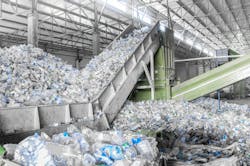How Trump's presidency could impact the plastics recycling landscape
By Corbin Olson
Senior analyst and researcher, ICIS
As the dust settles on the recent United States presidential election, the plastics recycling industry finds itself bracing for impact. A shift of policy decisions has the capability to either drive or hinder progress in this sector through influencing federal and state-level policies, public awareness and education, and funding mechanisms for the recycling infrastructure.
In the U.S., legislation affecting recycled plastics is predominantly driven by state policy. With the exclusion of chemical recycling acceptance policies, there is a noticeable overlap between states that typically support Democrats and those that have enacted legislation supporting plastics recycling as shown in the maps below.
Graphics provided by ICIS
Each of the 10 states with active extended-producer-responsibility (EPR), post-consumer recyclate (PCR), or bag-ban legislation are states where a majority of people voted for Democratic VP Kamala Harris in the recent 2024 presidential election, while a majority in eight out of the 10 states with deposit-return systems (DRS) programs voted for Harris. With the election of Republican Donald Trump, expectations for new federal or state-level legislation focused on plastics recycling are low. Many left-leaning states have already enacted such measures, while historically, Republican-leaning states have shown less inclination toward implementing similar legislation.
In contrast, a look at chemical recycling acceptance policies reveals the opposite pattern. Of the 25 states that currently accept chemical recycling, majorities in 22 voted for Trump this year. Consequently, we anticipate a continued expansion in the push for acceptance of chemical recycling.
In addition to recycling-focused policies, federal legislation such as increases in tariffs and energy independence also have the potential to affect the plastics recycling industry.
Trade tariffs
A signature achievement of Trump’s previous presidential term was the United States-Mexico-Canada Agreement (USMCA). With most U.S. recycled plastics being imported and exported between these countries, and the adoption of measures that would threaten the USMCA by the Trump administration unlikely, the volume of U.S. recycled plastics trade should remain consistent. On the other hand, Trump has vowed to significantly increase tariffs on all imports and cut corporate tax rates for domestic manufacturers, which could incentivize manufacturers in the U.S. to increase the demand for already limited domestically recycled resin.
On the virgin plastics side, Trump’s proposed tariffs could lead to retaliatory measures from other countries. U.S. chemical and virgin plastics producers are vulnerable to retaliatory tariffs since production capacities are typically set to meet significant export volume demand. The U.S. is a major exporter of both PE and PET, so retaliatory tariffs could impact this trade, creating significant oversupply, and, consequently, price decreases generating downward pressure on recycled commodity prices.
Energy policy
Trump supports more domestic drilling for gas and oil, to increase the nation’s energy independence. If the domestic production of gas and oil increases, the prices of domestically produced virgin plastics could decrease due to oversupply of these fuels, attracting buyers to use higher levels of virgin plastics at the expense of recycled plastics.
Although this is a potential outcome of Trump’s recent victory, much of the U.S. supply of gas and oil is produced through the private business sector, which is driven mainly by market prices rather than policies. The policies would however directly impact gas and oil production on federal land. Today, only a small percentage of total gas and oil production is on federal land, but Trump's push to expand available land for drilling could increase the influence of such policies.
During his previous presidential term, Trump rolled back numerous climate policies including some revolving around emissions. He continued to express his desire to decrease regulations in the energy and emissions sector during his recent campaign, which could potentially decrease the dependance on the recycling industry by improving the economic advantage of utilizing virgin content and reducing incentives to use recycling as a waste-management option.
Approach to multilateral agreements
Trump and the Republican Party have historically been skeptical of multilateral treaties, seeing isolationism as favorable for U.S. sovereignty and economic interests. Trump has argued that many global commitments unfairly disadvantage the U.S. and are burdensome to U.S. industries, which led him to withdraw from global initiatives such as the Paris Agreement during his previous presidential term.
If this stance is maintained, U.S. participation in other international commitments, such as the Global Plastics Treaty, could be at risk, if the U.S. federal government views them as a constraint on national economic priorities. This would further dampen demand for the recycled plastics market.
Government funding
Federal and state agencies provide financial support to recycling jurisdictions to support development of innovative technologies and upgrade infrastructure. For example, in December 2020, then-President Trump signed into law the Save Our Seas 2.0 Act to provide $55 million in funding each year through 2025 to improve post-consumer waste management, including municipal recycling programs and local waste-management authorities.
Aligning with consumer expectations, many companies have set voluntary sustainability goals that are separate from any legislative requirements. Consumer satisfaction and brand sustainability agendas can influence both state and federal officials to enact further legislation and funding, which would help the recycling market growth.
Chemical recycling
A majority of the 25 U.S. states that have accepted chemical recycling are Republican-leaning states. The Republican Party's push to reduce regulations might positively influence further chemical recycling acceptance since processes categorized as manufacturing are to be exempt from federal restrictions of the Clean Air Act imposed by the Environmental Protection Agency.
The Accelerating a Circular Economy for Plastics and Recycling Innovation Act is a Republican-leaning federal-level proposal supported by the American Chemistry Council (ACC) and Republican lawmakers. Included in this bill are aims to increase chemical recycling and the desire for the U.S. Environmental Protection Agency to accept producers' utilization of mass-balance calculations in order to comply with recycled content minimum regulations.
Growth in the recycling industry could be influenced by further acceptance of chemical recycling. Deregulation and the minimization of regulatory hurdles could spur further financial investments in the infrastructure, and acceptance of mass-balance calculations would allow producers to have flexibility with production and supply chains when incorporating recycled materials.
Conclusion
With evolving federal and state legislation, private brand initiatives, increased public awareness, and funding initiatives for recycling infrastructure, the waste-management industry is constantly being shaped by politics.
Policies under the newly elected Republican Party administration and Trump would seemingly focus on deregulation, international trade tariffs and domestic energy independence. While private company demand will continue to influence the recycled plastics market, potential legislation during Trump’s presidential term could lead to an increase in domestically produced virgin plastics supply, and at much more competitive prices.
At the same time, the continuation of federal government funding along with further acceptance of chemical recycling could increase the demand for and supply of domestically recycled materials.
ICIS is a global source of commodity intelligence.

